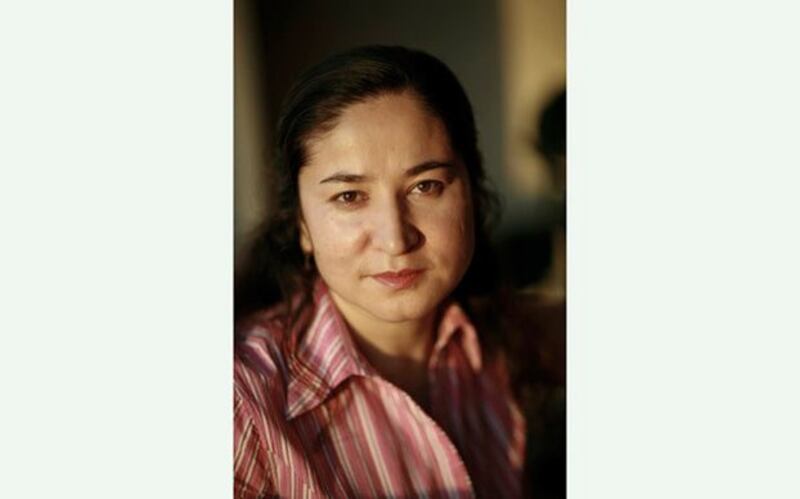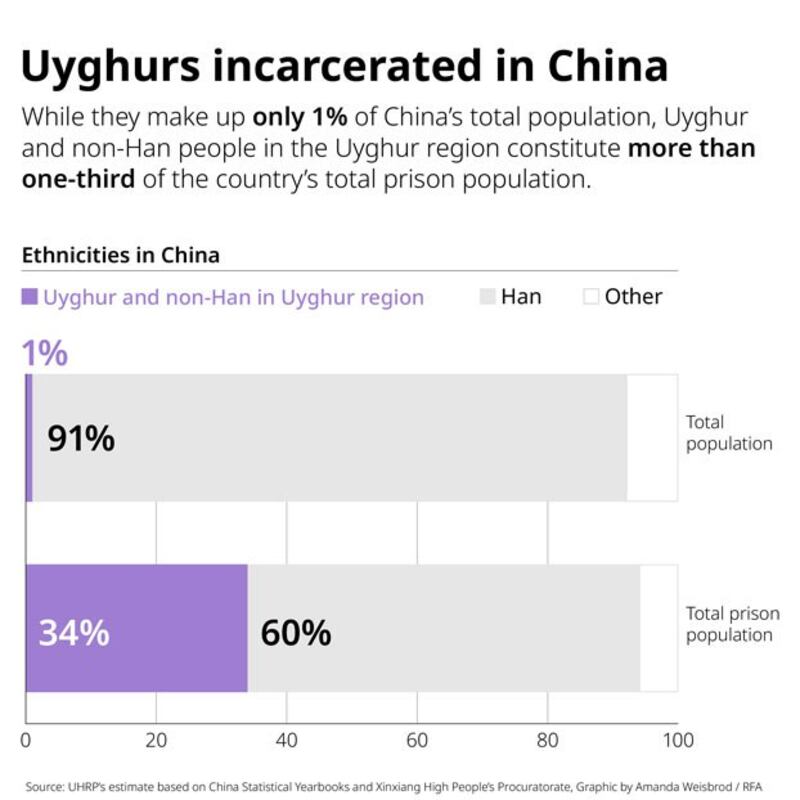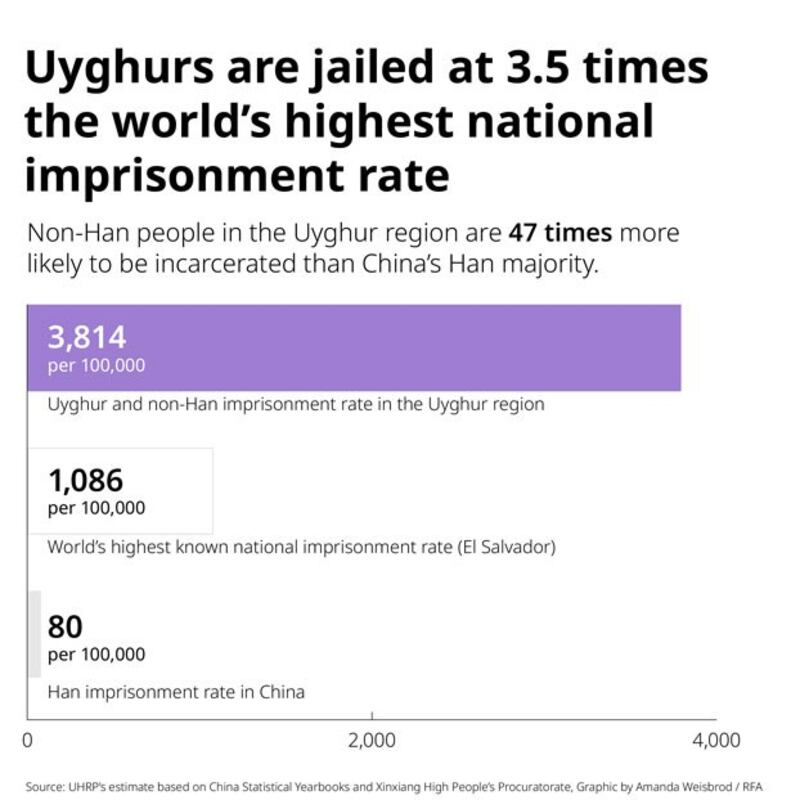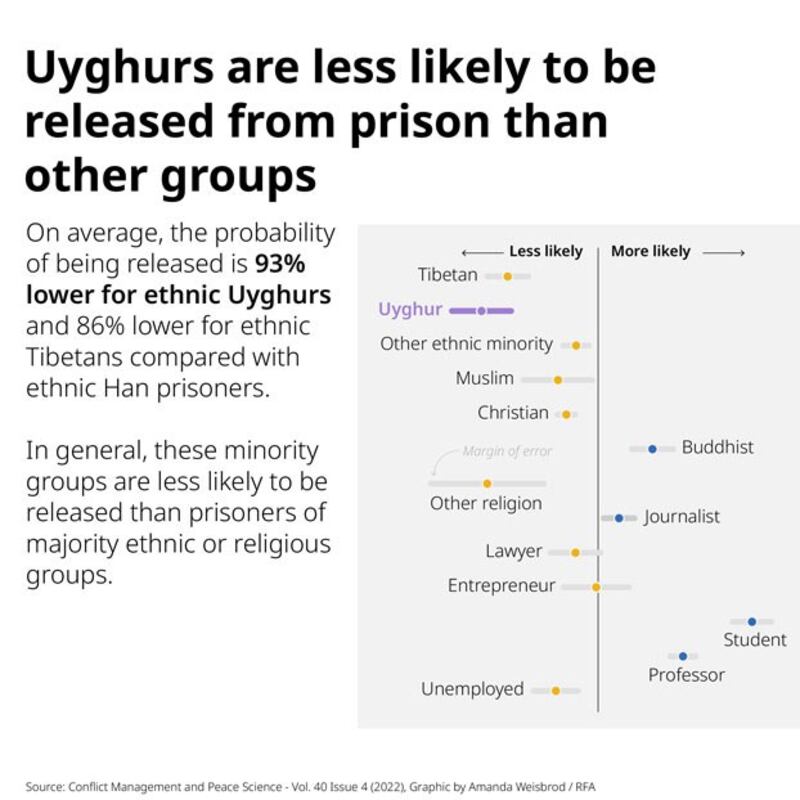An estimated one in 26 Uyghurs in China’s far-western Xinjiang region are behind bars, the world’s highest rate of incarceration, according to a report by a Uyghur advocacy group.
Uyghurs and other Turkic peoples there are imprisoned at an estimated rate of 3,814 per 100,000 people — 47 times higher than China’s overall rate of 80 per 100,000, the group said.
That's also more than three higher than in El Salvador, which has the world's highest known incarceration rate at 1,086 per 100,000 people, according to the April 25 report by the Uyghur Human Right Project, or UHRP.
All told, 578,500 Uyghurs or other Turkic people were in jail as of 2022, the group estimates. That’s just over one-third of China’s total prison population, even though they comprise only 1% of China’s overall population. That figure is likely the same or higher today, the group says.
A prominent imprisoned Uyghur is Rahile Dawut, a Uyghur folklore expert and ethnographer convicted in December 2018 for "splittism" and sentenced to life in prison.

Another example is Gulshan Abbas, a retired Uyghur doctor and the sister of Rushan Abbas, a former Radio Free Asia employee and current executive director of Campaign for Uyghurs. She was sentenced to a lengthy prison term on "terrorism" charges after she disappeared along with another relative in September 2018.
The U.S. State Department has said that Dawut and other Uyghur intellectuals have been unfairly imprisoned for their work to protect and preserve Uyghur culture and traditions.
The report’s findings are based on data from annual reports from the Xinjiang High People’s Procuratorate — which prosecutes criminal defendants — and information published on the website of China’s Ministry of Justice, covering the period 2017-2022. During that period, one in every 26 Uyghurs or members of other Turkic ethnicities in Xinjiang was incarcerated.

Many of those imprisoned have been convicted of crimes related to practicing Islam, such as studying the Quran when they were young or teaching it to others.
Reality may be worse
The actual situation in Xinjiang may even be worse, said UHRP senior researcher Ben Carrdus, who wrote the report.
“These are just people who have been put in prison. It doesn’t include people who might still be in internment camps,” he told Radio Free Asia, referring to the estimated 1.8 million Uyghurs and others arbitrarily detained in what the Chinese government said were vocational training centers.
The camps were, in fact, places where Uyghurs were subjected to political indoctrination and severe human rights abuses, including torture, the forced sterilization of woman and forced labor.
China claims that the camps have been closed.

When China says it’s ruled by law, it actually means that the law is whatever the Chinese Communist Party wants it to be, Carrdus said.
“Using laws doesn’t mean they are using justice. What they’ve done is use the instruments against the Uyghur people,” he said. “Thousands and thousands of people have been sentenced to prison mostly through the courts where China has used very unjust rules.“
The report indicates that Uyghurs experience higher death rates in prison than other ethnic groups in China, though death penalty figures are not publicly available because they are considered a state secret.
The UHRP believes Uyghurs receive severe sentences, such as at least 10 years in prison for minor actions like studying the Quran or teaching it to children, so that the rate of death sentences among them may be higher.

John Kamm, executive director of the U.S.-based human rights group The Dui Hua Foundation, emphasized the importance of highlighting the number of Uyghurs in prison to attract the attention of international media and governments in hope that they will push for their release.
Carrdus urged the international community not to forget the Uyghurs.
“I can say that with 100% confidence, things are not getting better,” he said, adding that although authorities in Xinjiang have been closing down the internment camps, they’ve been sending Uyghurs to prisons instead.
Edited by Roseanne Gerin and Malcolm Foster.

